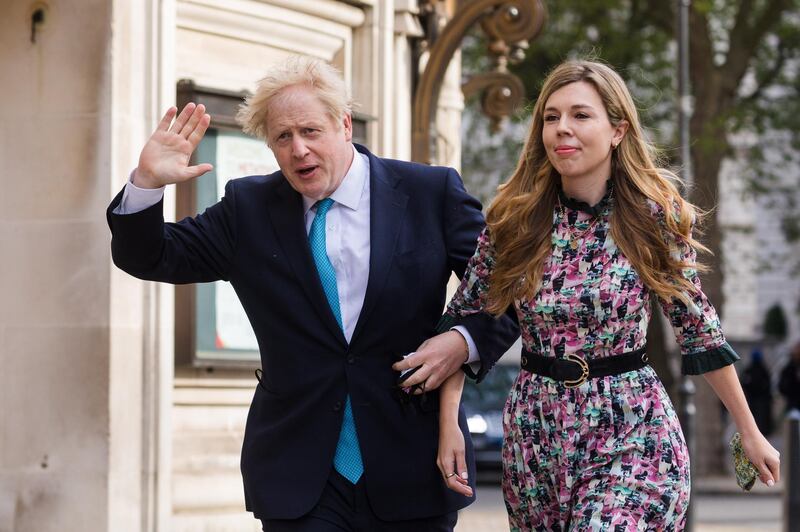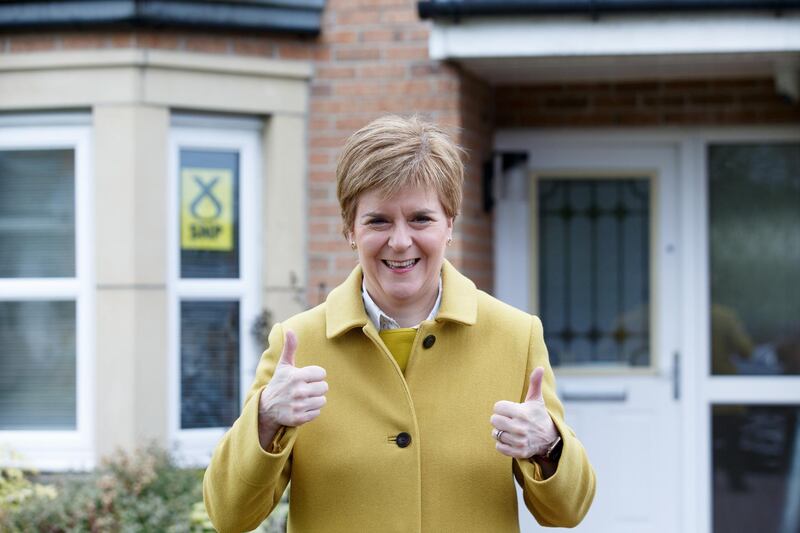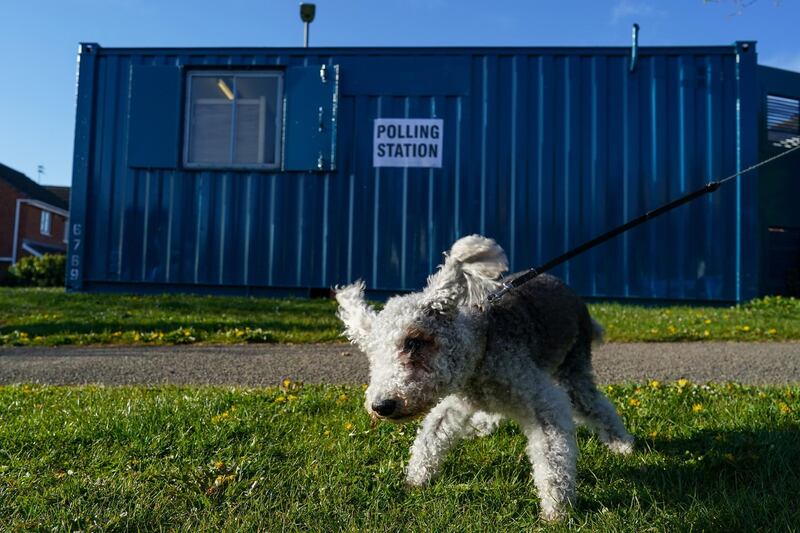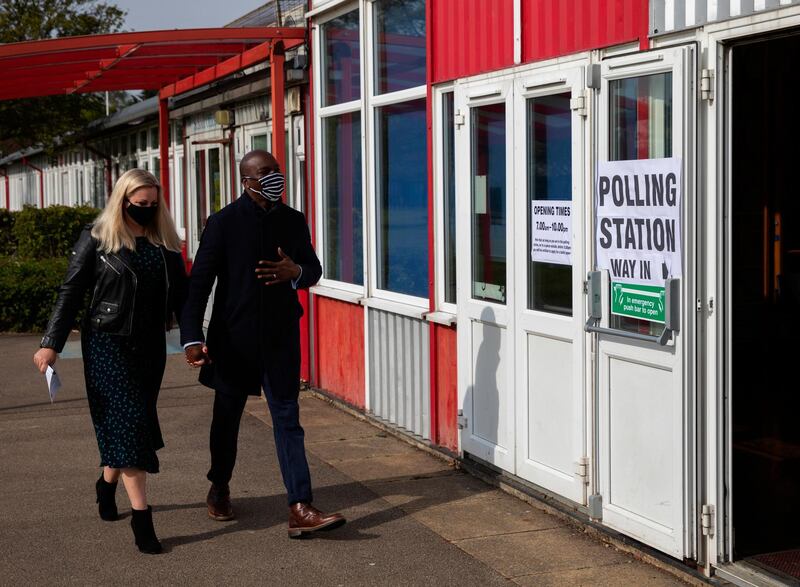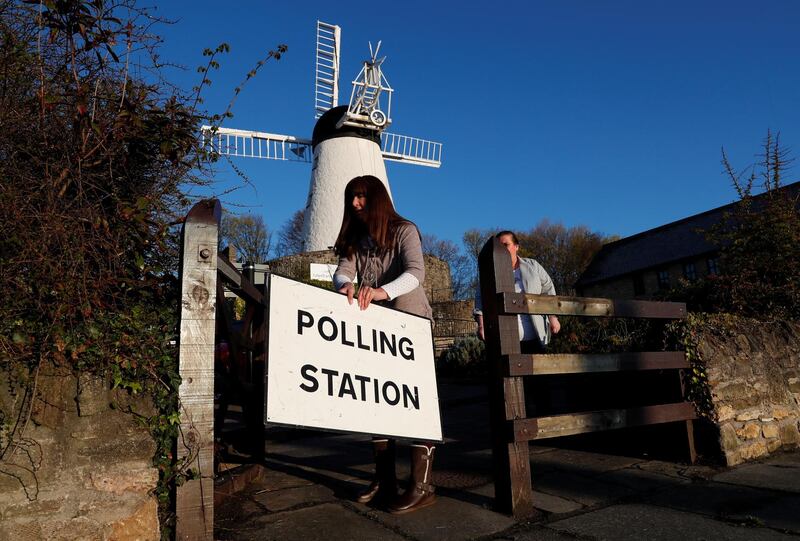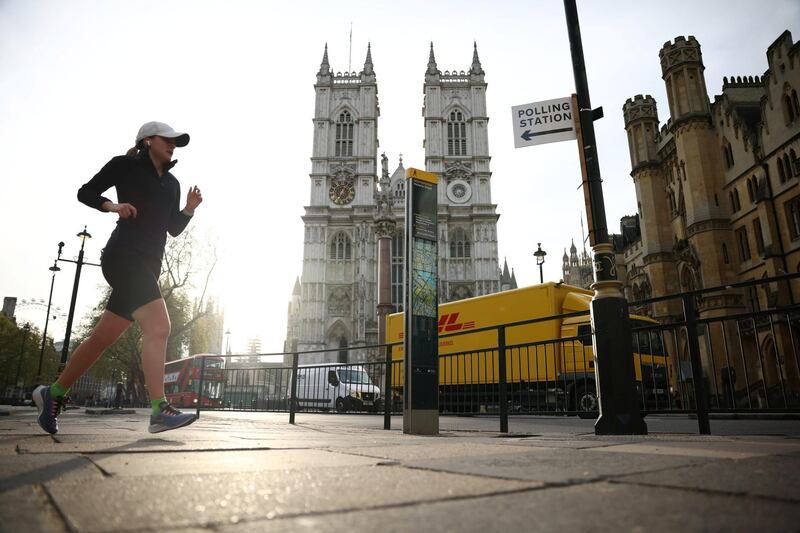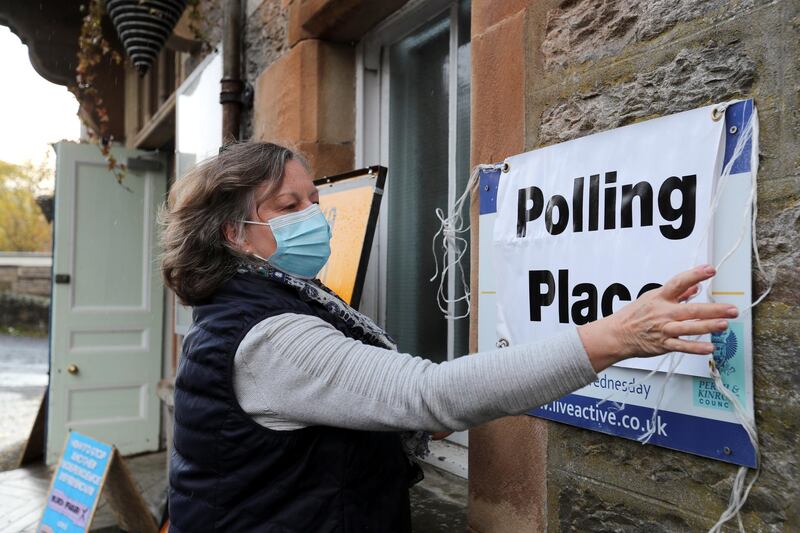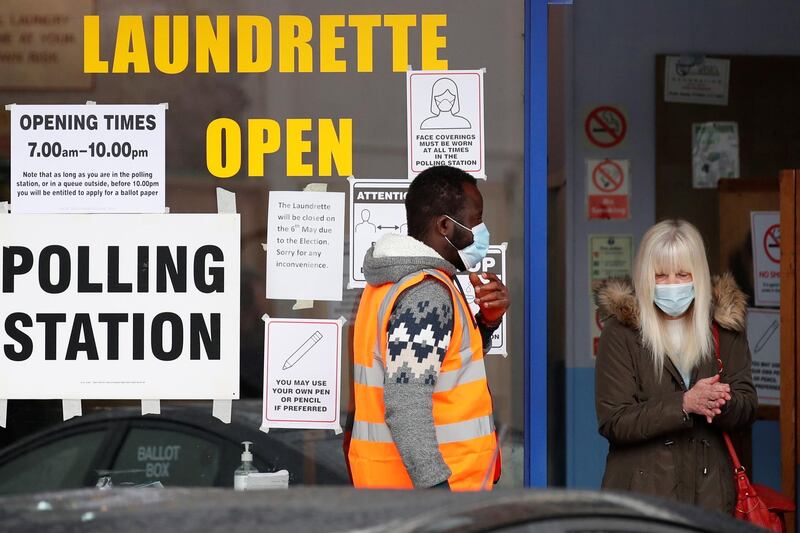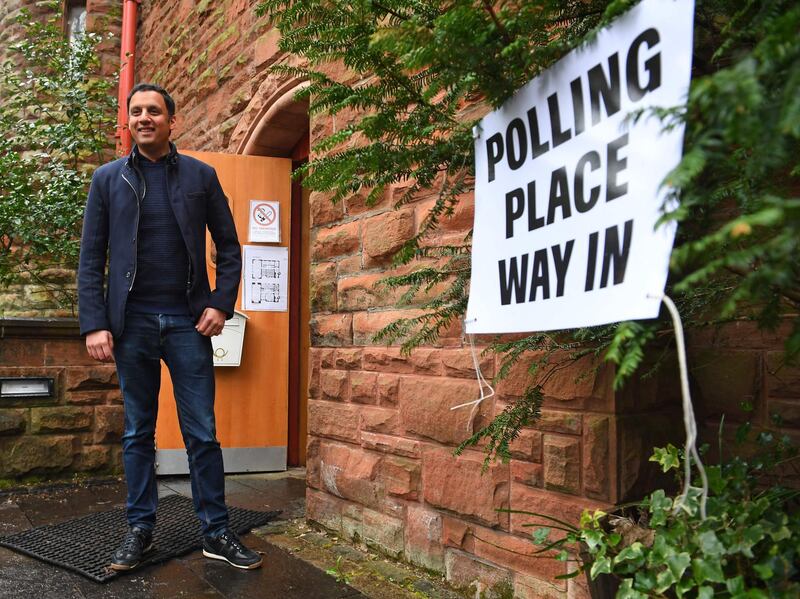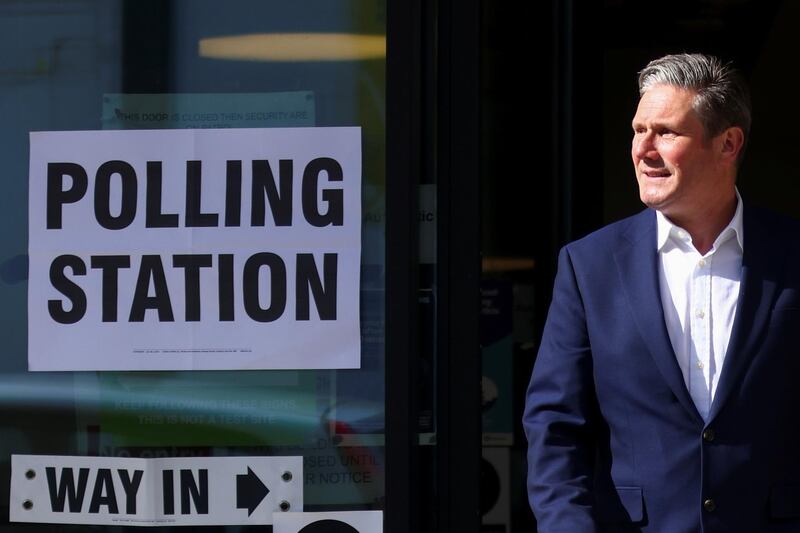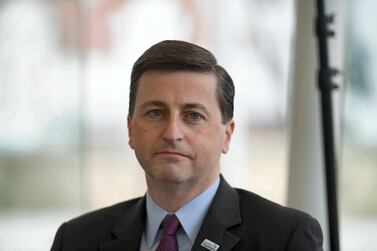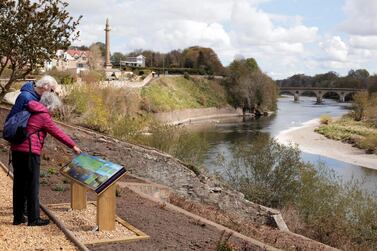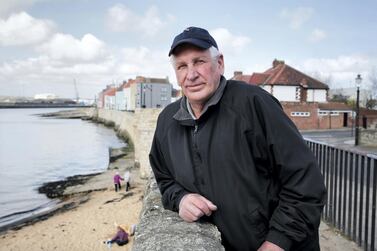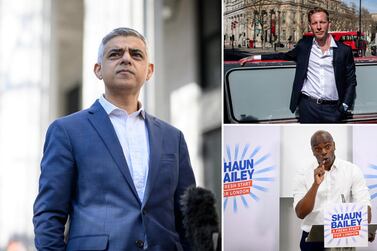Britain goes to the polls on Thursday in a bumper set of local elections, including a vote in Scotland that could hasten the break-up of the UK.
With everything from the mayoralty of London to the Scottish and Welsh Parliaments and seats on more than 100 local councils up for grabs, the results could be seen as a verdict on Boris Johnson’s government.
But the most consequential race is in Scotland, where an outright victory for the Scottish National Party would pile pressure on Mr Johnson to agree to a second independence referendum.
“Scotland is the one that matters,” said Professor Jonathan Tonge, a political expert at the University of Liverpool.
“I think it dwarfs all others, to be quite honest, because the aftermath of it will probably dominate politics for some time afterwards.”
Mr Johnson said on Wednesday that a second referendum during the pandemic would be reckless.
“I think that most people in Scotland, most people around the whole of the UK, feel that … as we’re coming forwards out of a pandemic together, this is not the time to have a reckless, and I think irresponsible, second referendum,” he said.
Across the UK, Mr Johnson’s Conservatives enjoyed a bounce in the polls as the country’s rapid vaccination programme led people out of lockdown.
The Labour opposition led by Sir Keir Starmer is hoping for signs of recovery 18 months after it suffered a historic thrashing at the last UK general election in 2019.
Labour’s Sadiq Khan is poised for re-election as mayor in London, but the party faces a potential setback in a closely watched by-election in the north-east English town of Hartlepool.
The National examines what's at stake on an election day.
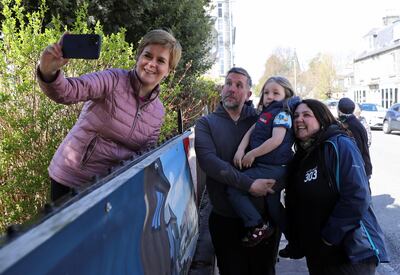
Scotland: The next step towards independence?
What's up for election: All 129 seats in the Scottish Parliament.
Who's in the running: The SNP, led by Scotland's First Minister Nicola Sturgeon, is seeking its a fourth election victory in a row and a mandate to hold a new independence referendum.
The Conservatives, currently the second-largest party in Scotland, are seeking to deny the SNP a majority and weaken its push for independence.
Labour elected Anas Sarwar as the UK's first Muslim party leader in February and hopes to beat the Conservatives to second place.
“He comes across pretty well. He’s the most plausible leader they’ve had in a while,” Prof Tonge said of Mr Sarwar.
There is also a new player on the scene in the form of the Alba Party, a pro-independence party set up by the SNP's former leader Alex Salmond after he was embroiled in a personal feud with Ms Sturgeon.
Why it matters: The future of the 314-year union between England and Scotland hinges on this election. If the SNP wins a majority, it will seek to hold a referendum on independence by the end of 2023.
The UK government opposes a referendum, but a resounding SNP victory would put pressure on Mr Johnson to allow one, to prevent what Prof Tonge called a “Catalan-style situation” with protests in the streets.
What the polls say: The SNP is expected to remain in power, but whether it will land a majority to fire up its independence push is less clear. Most polls show the Conservatives edging ahead of Labour.
Mr Salmond is calling for SNP voters to give the second of their two votes to Alba, to give pro-independence parties a “supermajority”, but polls show Alba winning less than 10 per cent of the vote.
“The dream for Salmond is for the SNP to fall slightly short so that she [Ms Sturgeon] needs him,” Prof Tonge said.
“You’ve got a very savvy political figure potentially back in the Parliament, so there’s plenty of drama to be had there.”
When to expect results: Many votes will be counted on Friday, but the full picture will not become clear until Saturday when the regional vote is tallied.
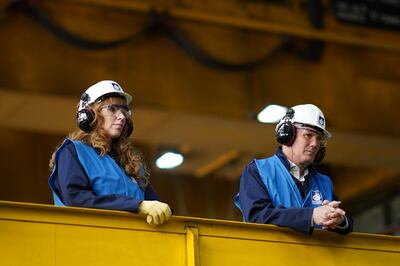
Hartlepool: Conservatives seek historic gain in by-election
What's up for election: Hartlepool is electing a new Member of Parliament after its previous MP, Labour's Mike Hill, resigned in March.
Who's in the running: There are 16 candidates, but the election is seen as a two-horse race between Labour and the Conservatives.
Labour’s nominee is Paul Williams, a former MP for Stockton South. The Conservative candidate is Jill Mortimer, a local councillor in North Yorkshire.
Why it matters: Although the practical implications are limited to one of 650 seats in the House of Commons, the symbolic effect of the result will be huge.
That is because Hartlepool is typical of the kind of pro-Brexit, working-class town in which the Conservatives made historic gains at the 2019 election and where Labour must to reinvigorate itself to stand a chance of winning national power.
If the Conservatives were instead to gain further ground by picking up Hartlepool, it would send Labour into more despair and inevitably prompt questions about Mr Starmer’s leadership.
“Hartlepool is enormously important as an indicator of the Conservatives’ capacity to change and to become relevant to people who, until very recently, were hardcore Labour voters,” Professor Tony Travers of the London School of Economics said.
“If Labour wins it against all the odds and the polls, I think they would see that as an enormous relief. If they lose it, certainly if they lost it with a substantial majority, it implies that there is massive work to do.”
What the polls say: A Survation poll published on Tuesday showed the Tories with a 17-point lead.
When to expect results: A result is anticipated in the early hours of Friday.
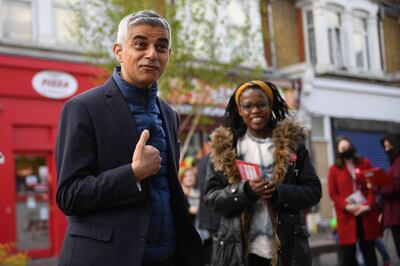
London: Sadiq Khan poised to win second term as mayor
What's up for election: The mayor of London, and 25 members of the Greater London Assembly who scrutinise his work.
Who's in the running: Labour's Sadiq Khan is running for re-election five years after he became the first Muslim mayor of a major western capital. His main challenger is Conservative candidate Shaun Bailey, a former social worker.
A long list of minor candidates includes Piers Corbyn, the Covid-sceptic brother of former Labour leader Jeremy Corbyn, and Laurence Fox, a TV actor who casts himself as a champion of free speech against a supposed “woke mob”.
Why it matters: The mayor has significant responsibilities for policing and transport in the UK's economic hub and represents London around the world.
What the polls say: Mr Khan has a comfortable lead in the polls and is expected to win easily.
While the bitter fallout from Brexit helped turn places such as Hartlepool away from their Labour roots, London moved in the opposite direction after voting to remain in the EU and is now a formidable Labour stronghold.
“A quarter of all the seats the Labour party has in Parliament are currently London seats,” Prof Travers said.
“But even doing well in London carries with it this slightly awkward implication for Labour that they’re increasingly just a party of big cities.”
When to expect results: Saturday evening at the earliest.
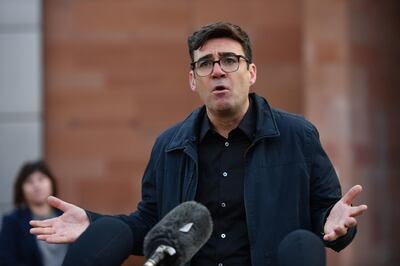
Regional mayors: Cities go to the polls across England
What's up for election: The mayors of 12 cities and regions outside London, including major urban areas such as Liverpool and Greater Manchester. West Yorkshire is choosing a directly elected mayor for the first time.
Who's in the running: Several mayors first elected in 2017 are running for a second term, including Labour's Andy Burnham in Greater Manchester.
They also include Conservative mayors Ben Houchen and Andy Street, who pulled off landmark victories in the historically Labour-supporting Tees Valley and West Midlands regions four years ago.
Former Cabinet minister Liam Byrne is running as the Labour mayoral candidate in the West Midlands this time.
In West Yorkshire, the Labour candidate is former TV actress and current MP Tracy Brabin. The Conservative nominee is local councillor Matt Robinson.
Why it matters: England's regional mayors are accountable to nearly 12 million people. On a political level, the results will offer another sign of whether Labour is making any progress in recapturing its former heartlands.
“You would expect, at this stage of the electoral cycle, the opposition party to be making significant headway,” Prof Tonge said.
“The fact that they are not expected to make a huge amount of gains speaks volumes about the parlous state of the party.”
What the polls say: In a blow to Labour, a pair of last-minute polls showed the Conservatives on course to hold their ground in the Tees Valley and West Midlands elections.
Polling is sparse in other races, but Labour is expected to hold the Greater Manchester and Liverpool City Region posts.
West Yorkshire is usually Labour territory, but the Conservatives made gains there in the 2019 general election.
When to expect results: Counting in many of the mayoral races will take place on Saturday, although the West Yorkshire result is not expected until Sunday.
Wales: Labour seeks to extend its term in power
What's up for election: All 60 seats to the Welsh Parliament, or Senedd.
Who's in the running: Labour has been the largest party in Wales ever since the parliament was created in 1999, and current First Minister Mark Drakeford is running for re-election.
The Conservatives, led by Andrew RT Davies, are touting the success of the UK government in leading the national vaccination programme.
Also in the running is the Welsh nationalist party, Plaid Cymru, which won 12 seats at the last election. Meanwhile, the UK Independence Party is calling for the Welsh Senedd to be abolished altogether.
Why it matters: The Welsh Senedd has more powers than ever, including the one to set rates of income tax. Wales is another pro-Brexit Labour heartland where the Conservatives are calling for a historic change.
What the polls say: Labour leads in the polls, putting it on course to remain in government.
When to expect results: Results are due by Friday evening.
English councils: Thousands of seats up for grabs in benchmark vote
What's up for election: There are elections to 144 councils on Thursday, some of which were postponed from May 2020 because of the pandemic. There are also 39 police and crime commissioners up for election.
Who's in the running: Thousands of local candidates seeking to fill more than 4,600 council seats across England.
Why it matters: Council elections are traditionally a benchmark of the government's popularity between general elections. But they also matter to local people.
“It is inevitable they’re used as a measure of the national parties’ standing, and I get that,” Prof Travers said.
“But in many ways, the question of older people’s care homes, and children’s social care, and whether the streets are clean … one would hope [they] would play a role in these elections. In the end, those things do matter.”
What the polls say: There are few specific polls for council elections, but national polling has shown the Conservatives holding a consistent lead since Britain began to emerge from its dire winter peak of coronavirus infections.
One model published by YouGov last week projected that Labour would lose 59 seats in its former “Red Wall” heartlands, and potentially lose control of several councils.
When to expect results: Some results will be in by Friday morning, but others will keep trickling in until Sunday and perhaps later.
More on Britain
UK nuclear deterrent under a cloud as Scottish nationalists chase victory
Gordon Brown warns pandemic is becoming a 'man-made catastrophe'
Boris Johnson should be busy with state affairs - not curtains
